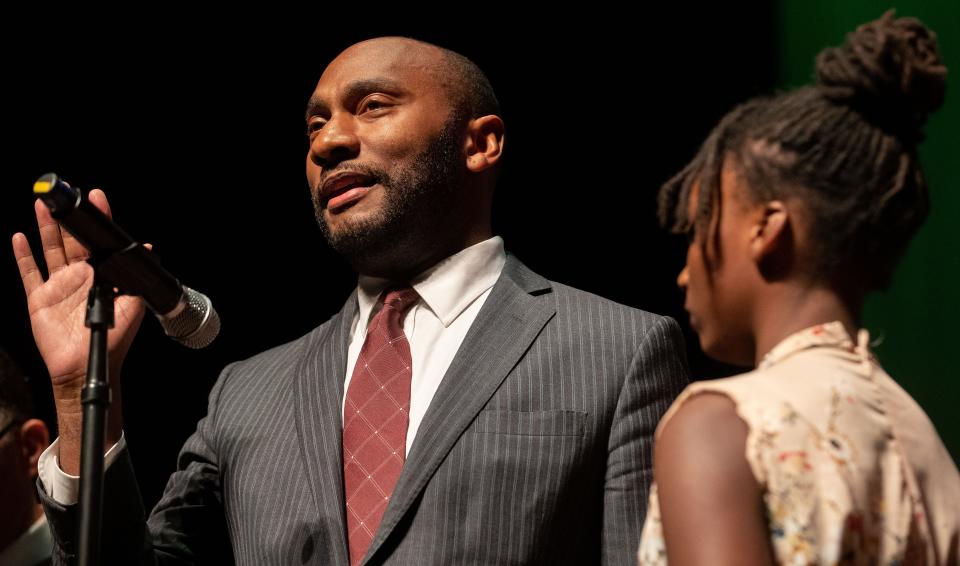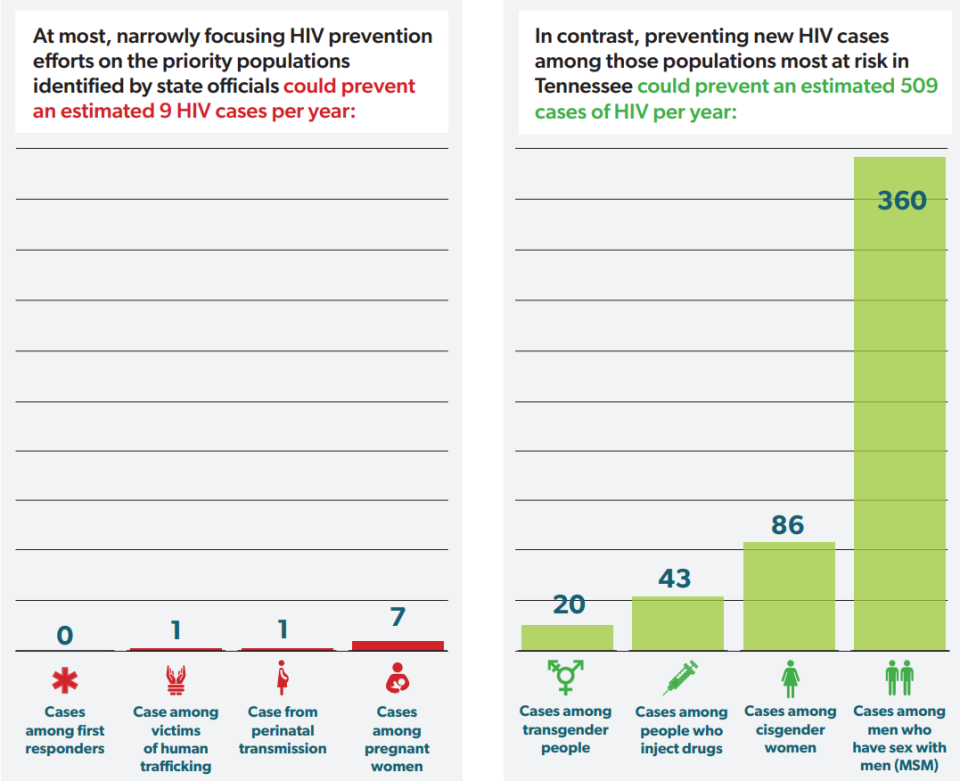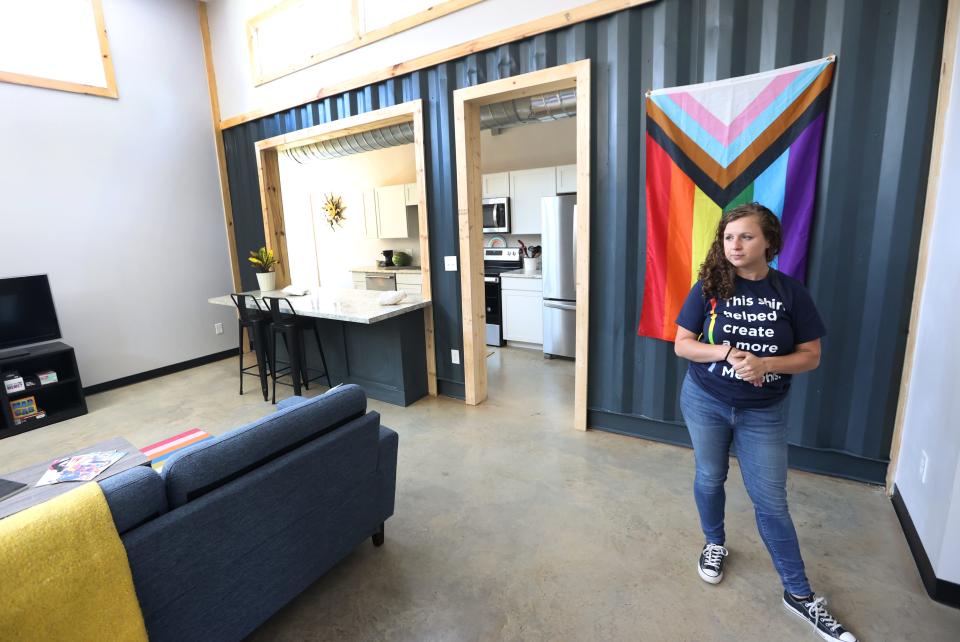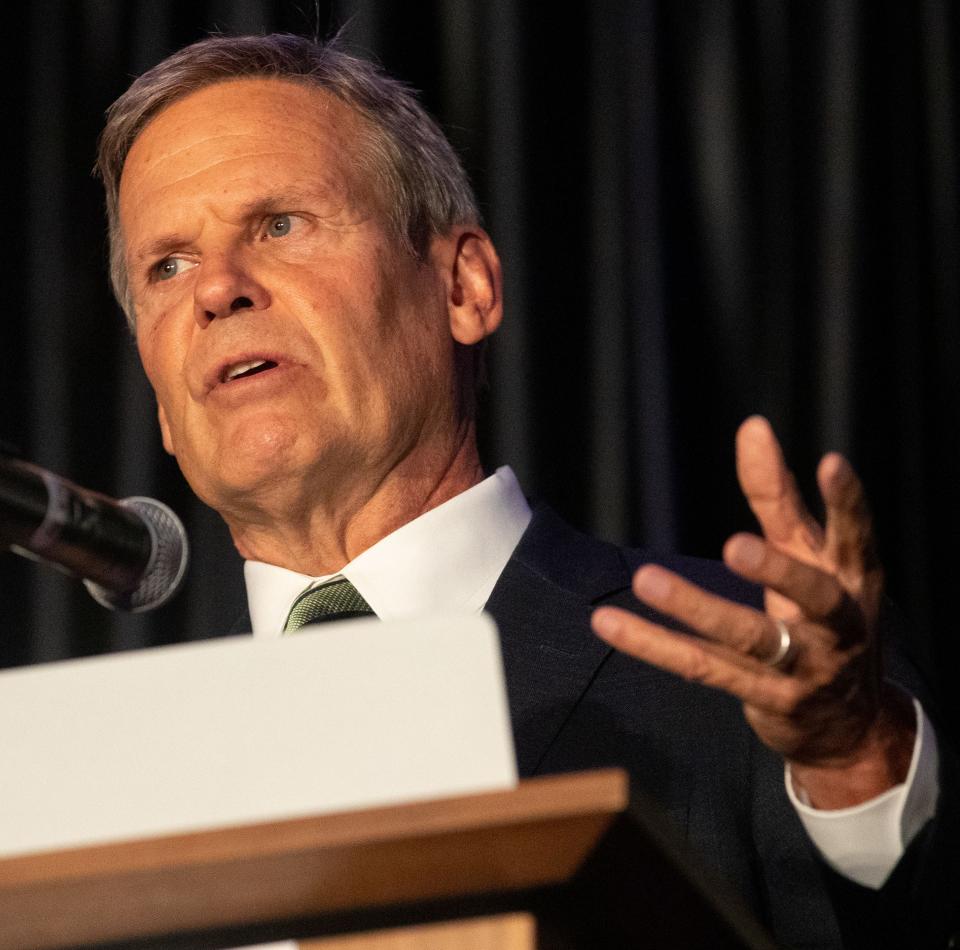'A public health crisis': What state's rejection of HIV funds could mean for Shelby County
A decision by the state of Tennessee in January to forgo several pots of federal dollars for HIV-related programming was met across the state with shock and widespread concern about the potential impacts in a region with the highest transmission rate in the U.S.
Many worry the repercussions will be especially severe for Shelby County, which has a transmission rate high enough to qualify it for extra federal funding for HIV testing and surveillance. Without the federal dollars, advocates and nonprofits say the state's surveillance network could fall apart and HIV could spread relatively unchecked. The organizations that relied on the dollars could be forced to cut staff and programming if new funding sources aren't secured.
In a letter to Gov. Bill Lee and Tennessee Department of Health Commissioner Ralph Alvarado, Shelby County Mayor Lee Harris implored state leaders to reverse the decision.
“Without this funding, there will likely be a reduction in available evidence-based community programs. These trusted local institutions will see a decrease in testing, delays in access to services and clinic closures,” Harris wrote in a letter that was shared with The Commercial Appeal. “The inability of the local health department to rely on certified partner organizations may result in increased burdens on staff and strains on resources. The rejection of funds could lead to a public health crisis for several vulnerable populations.”
Previously:Tennessee to cut off funding to nonprofits for HIV prevention, testing
Healthcare news:Blue Cross, Methodist reach agreement for TennCare patients

The more than $8 million in funding came from two Centers for Disease Control and Prevention grants that United Way of Greater Nashville distributed to community-based organizations and healthcare groups across the state on behalf of TDH. Those groups were notified in mid-January the state would no longer be accepting the federal funding.
The federal funding includes a grant specifically for Shelby County, which is about $2.1 million, annually. In the current grant year, the state has so far received about $4.8 million in reimbursements from the $6.2 million in surveillance and prevention funds, and $115,084 of the Shelby County grant, according to the Tennessean.
Grant dollars will stop flowing on May 31 and it's unclear how much additional funding the state will get by then.
Diane Duke, executive director of Friends For Life, a Memphis-based nonprofit focusing solely on stopping the spread of HIV and assisting those living with HIV or AIDS, said the implications for Shelby County, with its many factors contributing to disparate health outcomes, could be wide-ranging. The group is one of the local organizations that will be impacted by the state's decision to decline federal funding.
“The health of our community is what's at stake here,” she said. “Somebody who walks through our doors who might find out that they're HIV positive might also be a diabetic or might have a mental health issue… or to all of these other factors that contribute to the poor health of the community, and if members of a community are unhealthy then the community is unhealthy. I think we need to take a look at our whole community and understand that we are really the sum of how we treat everyone in it."
'People just don't understand the logic'
Preliminary CDC data show 831 new cases of HIV were diagnosed across Tennessee in 2021 and 575 new cases were diagnosed in the first nine months of 2022. AHEAD, which solely tracks HIV-related data, includes a data subset for Shelby County. According to AHEAD, Shelby County saw 232 new HIV diagnoses in 2022.
While the federally funded Ryan White Part B program is not impacted, the cuts in funding could impact myriad other HIV-related initiatives.
Dr. Nathan Summers, an internal medicine and infectious diseases physician who works in Regional One Health’s Adult Special Care Clinic, said in addition to the testing, education and surveillance work done by community-based organizations, they’re also some of the main providers of PrEP, pre-exposure prophylaxis, which greatly reduces the risk of acquiring HIV.
“These organizations that are losing this funding have been the main groups meeting this need in our community in Memphis, losing these funds is going to create a PrEP vacuum. And I worry that many of these patients are going to fall out of care and be at risk for acquiring HIV,” he said.
The Regional One clinic, which is dedicated to caring for adults who are HIV-positive, will not lose any funding because of the state’s decision. But Summers said healthcare institutions rely on the work done by the organizations that are going to lose their funding.
"There's still unfortunately a lot of stigma that goes along with HIV, but there's also medical mistrust and a lot of other factors that play into where a person would feel comfortable getting HIV care or HIV preventative services," he said. "All of our community partners, we work together in a web network, to meet everyone in the city as much as possible where they are."
Healthcare:'A mobile Intensive Care Unit.' Le Bonheur gets federal funding for 2 high-tech ambulances
More:Letter: Tennessee tried to remove Planned Parenthood from program before HIV grant cut
The move to reject the funding seems to be unique to Tennessee.
“This is the first I've heard of something like this. I think people just don't understand the logic in turning down millions of dollars,” Duke said.
amfAR, The Foundation for AIDS Research ― a national HIV-focused advocacy and research group ― said Tennessee last year received more than $8 million for these programs from the CDC, a figure also cited by local experts.
Moving forward, the state plans to fund HIV-related programming through the six metro health departments, but has not spelled out how that will be done or how rural populations will be served.

The Shelby County Health Department did not respond to a request for comment. But at a public panel discussion about disparities in health care, SCHD Director Dr. Michelle Taylor was asked about the situation. While she said she was seeking more information herself, she stressed the importance of HIV testing and surveillance locally.
"We have almost 7,000 people living with HIV in Shelby County. The majority of them are African American. And we have a very high rate of new infections when you look across the rest of the country," she said.
Questions and confusion about HIV funding change
OUTMemphis Executive Director Molly Quinn said the role nonprofits play in combatting both the virus and the stigma associated with it is essential in putting an end to the HIV epidemic. The LGBTQ resource center serves the entire Mid-South and includes some HIV-focused resources.
For OUTMemphis, the funds from the CDC grants ― about $120,000 annually ― represent about 10% of the organization’s overall budget and provide about two-thirds of the funding for its HIV-related programming. The remainder comes through the Ryan White Part B program.

In Memphis:How Methodist Transplant Institute's new leader plans to move center forward
Healthcare news:How Le Bonheur Club has impacted Memphis healthcare scene for 100 years
“This is a majority of what we do that's related to HIV,” Quinn said.
She expressed great concern about making sweeping changes to successful programs.
“There's no confusion about what HIV does… it's not an emerging issue,” Quinn said. “These are programs that have been running for a long time. There’s nothing new and radical about this.”
According to TDH, the grants from the CDC fund: “HIV counseling, testing and referral, HIV partner counseling and referral services, HIV health education and risk reduction programs, HIV prevention for positive individuals, public information programs, a toll-free HIV/STD hotline, capacity building programs, and a quality assurance and evaluation component.”
Lee did briefly address the situation with reporters last month.

“The funding for this HIV prevention program is very important and it's important that it is spent effectively and efficiently in the ways that best serve Tennessee," he said. "We think we can do that better than the strings attached with the federal dollars that came our way and that's why we made that decision."
However, multiple organizations have pushed back against the assertion it is in the best interest of Tennesseans.
“The long and short of it is that, you know, Tennessee is not doing a good job of taking care of its citizens,” Quinn said. “We're seeing that in our criminal justice system, we're seeing that in our poverty safety net. And I feel that this decision is just part of that trajectory.”
In a statement, amfAR said the “decision is short-sighted and undermines the state’s public health and response to HIV while limiting community access to critical services.”
The group emphasized Shelby County’s high HIV infection rate and said taking apart the state’s HIV surveillance network puts the state at higher risk of HIV outbreaks.
“amfAR strongly encourages the Tennessee Department of Health to carefully assess the likely public health consequences of its rejection of available federal funding for HIV services and to continue to accept critical funding that benefits communities across the state,” the group said. “We have come too far in addressing HIV as a nation to undercut our progress for short-term political gain.”
What happens next?
The state has said priorities in HIV-prevention funding would be shifted moving forward to focus on first responders, victims of human trafficking and pregnant women. According to research from amfAR, that could prevent about nine cases of HIV transmission annually.
In contrast, focusing on the most at-risk populations in the state ― which includes transgender individuals, people who inject drugs, cisgender women and men who have sex with men ― could prevent more than 500 new infections annually, the group estimated.
Duke said there was a lot of speculation about what drove the decision to stop accepting the federal money, but she was focused on what happens next.
“I don't want to focus on why the money is gone. It's gone. So now we need to figure out what we're going to do,” she said. “We've got incredible nonprofits in Memphis, and we've got people who work well together. And so we're gonna put our heads together and see what we can do to solve this problem.”
Local news:Mental Health Cooperative to open Memphis clinic in spring of 2023
'The model of healthcare': A look inside Baptist’s new Arlington emergency department

U.S. Rep. Steve Cohen, D-Memphis, hosted a call a few days after the state's decision with community organizations that could lose funding. The congressman also sent a letter to Xavier Becerra, secretary of the U.S. Department of Health and Human Services, asking for the federal government to circumvent the state and sent HIV-related funding directly to community organizations and local health departments.
“Governor Lee’s decision to end participation in the CDC Prevention and EHE program will limit Tennesseans’ access to lifesaving health care, which is already hampered by the state’s repeated refusal to expand Medicaid under the Affordable Care Act," Cohen wrote.
The letter was posted online and shared with reporters.
Duke said she has not given up on the funding and she and other nonprofit executives are looking at a variety of options for how to get the money from the CDC to Tennessee groups.
But for now, these community organizations, the clients they serve and the programs they provide remain in limbo.
The Associated Press contributed to this report.
Corinne S Kennedy covers healthcare, real estate and economic development for The Commercial Appeal. She can be reached via email at Corinne.Kennedy@CommercialAppeal.com
This article originally appeared on Memphis Commercial Appeal: Tennessee rejects CDC's HIV funds: What it means for Memphis area

